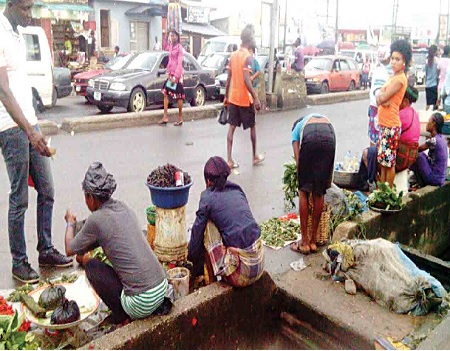Residents of Ibadan have expressed concern over what they call indiscriminate displaying of wares on major streets of the city by traders and the attendant danger to lives and property.
A cross section of the residents, who spoke with the News Agency of Nigeria (NAN) on Thursday, lamented that virtually all the major roads and streets in Ibadan have been taken over by traders.
The residents said that the development, which they described as unfortunate, had compounded the usual traffic snarl being experienced within the metropolis on daily basis.
Aside the traffic congestion, they said that the city had also been bedeviled by overcrowding, narrowing of roads and sometime, outright barricading of roads in some places by the activities of the traders.
NAN observed that traders at Iwo-Road, Monatan, Gate, Mokola, Dugbe, Challenge, Oje, Apata, Ojoo and Omi-Adio have turned the roads to places for displaying of their wares, while most pedestrian walkways have also become extensions of their shops.
A community leader, Mr Badmus Akindele, decried the situation at Mokola, saying that the area had been turned to death trap for unsuspecting traders, commuters and passersby.
Akindele said: “Traders have turned the walkway and the service lane to their shops, replacing their usual trays with tables, thus forcing passersby to struggle with motorists, tricyclists and commercial motorcyclists for right of passage.
Akindele urged the state government to look critically into the matter and enforce compliance, adding that any trader found operating on the road should be apprehended and made to face the full wrath of the law.
He said that government could also ensure that such traders were made to forfeit their goods to serve as deterrent to others.
Another resident, Mrs Munirat Kajola, said that the state government must, as a matter of urgency, evacuate street traders within Ibadan metropolis to allow for easy passage by passersby, motorists and commutters.
A civil servant, Mr Johnson Adeagbo, said that the dangers inherent in street trading could not be over-emphasised, adding that it had resulted in accidents that had claimed many lives.
A resident of Omi-Adio in Ido Local Government Area, Mr Christopher Olorode, described the popular Oja-Agbe (farmers’ market) in the area as a disaster waiting to happen, if the government did not do something urgent.
Olorode indeed called on the government to relocate the market to another area or, in the alternative, move the traders, who usually trade on the main road, inside and erect a perimeter fence to forestall a looming danger.
Similarly, Prof. Oyedunni Arulogun, Director, Centre for Enterprenureship and Innovation, University of Ibadan, said that people patronising roadside traders should be made to face the music for encouraging roadside trading.
According to Arulogun, if there are no buyers, there will not be sellers of goods by the roadside.
“Above all, there should be continuous engagement of the traders who have chosen to sell their wares by the roadside on the danger inherent in street trading.
“Government should also ensure the enforcement of the laws regulating roadside trading.
“If laws were made to regulate the practice of standard malls and supermarkets, then, government should apply those laws to clear our roadsides of illegal trading,” the don said.
Mr Femi Aborishade, a human rights lawyer, described roadside trading as a reflection of the serious malaise in the economy.
Aborishade attributed the situation to what he called the by-product of the school drop-out and mass unemployment phenomena.
“Where decent jobs are provided by governments and children of school age kept in school, the phenomenon called roadside trading will evaporate gradually.
“Roadside trading should be seen as an index of the greater socio-economic problems crying for urgent solution.
“Those engaging in roadside trading are compelled by the need to address some existential challenges, leading to risking their lives trading on the streets.
“Governments at all levels should not be encouraged to inflict pangs and pains on them by criminalising roadside trading.
“Rather, this unfortunate development should serve as a challenged for them to address the socio-economic conditions and challenges forcing the traders to the streets.
“The rich, who established their shops and offices on the road, such as banks, also engage in roadside trading in a way, with serious implications on free flow of traffic.
“Interestingly, the people are overlooked, while the poor, who lack the financial capacity to rent offices, are repressed and suppressed by the criminalisation policy.
“Let governments address the root causes of roadside trading rather than criminalising it,” Aborishade said.
NAN reports that the menace of roadside trading in Ibadan city has remained a thing of concern to many.
NAN also reports that several efforts had been made by successive administrations, particularly, the late Abiola Ajimobi-led administration, to eradicating the menace of street trading, resulting in seizures of goods displayed on the roads.
The administration also established a number of neighbourhood markets through the local governments in Ibadan municipality, where people could engage in buying and selling.
NAN, however, observed that most of the neighbourhood markets have been deserted by the traders, while they have found the roads as safe haven for their business.
A director in the state Ministry of Environment, while reacting to the development, said that government was not taking the menace of roadside trading, particularly in Ibadan metropolis, with levity.
The director, who spoke on condition of anonymity, said that some measures had been taking by the state government to address the menace.
He said that government had, on many occasions, given street traders notices to vacate the roads, adding that erring traders would be made to face the wrath of the law upon the expiration of the vacation notices.
The director also said officials of the ministry had carried out sensitisation to roadside traders at Molete under-bridge, Challenge, Bodija, Apata and Oojo, among other areas, to let them know the hazards associated with the practice. (NAN)


